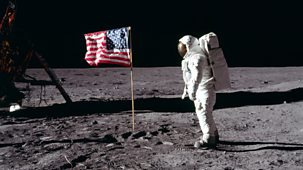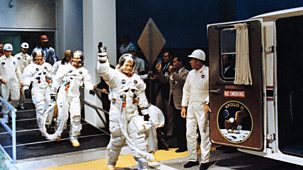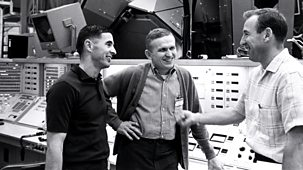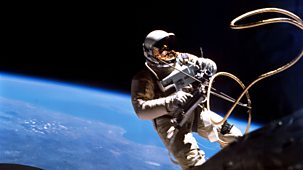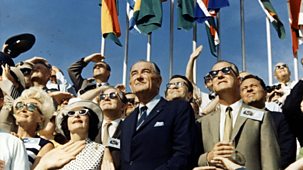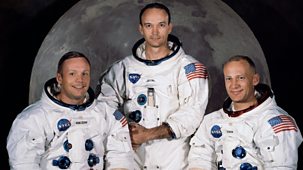
Series 1: 5. Magnificent Desolation - Part 1
After the immediate celebration of 1968’s successful Apollo 8 mission, underlying questions about the space programme emerged with new intensity as politicised young Americans challenged the nation’s priorities. Nasa pushed brashly forward. \n\nAfter the lunar orbit, competition escalated among the training astronauts. Who would be chosen for the first moon landing? In January 1969, Nasa ended months of speculation and announced the crew for Apollo 11. Buzz Aldrin and Neil Armstrong would be in the craft that landed on the moon. They would be supported by Mike Collins in the command module. As ever, the Soviet Union loomed large over the new Nasa mission, scheduling an unmanned craft to land on the moon at approximately the same time as Apollo 11. \n\nIn mid-July, 1969, crowds flooded Cocoa Beach in anticipation of the historic launch and, on 20 July 1969, the biggest television audience in world history tuned in. Audiences watched simulations and listened to audio coverage with baited breath as Armstrong delicately piloted the lunar module, only to discover the landing site was a football field-sized crater. It forced him to hover the craft and look for a new site with just 30 seconds of fuel left. Finally, audiences heard the triumphant words, ‘The Eagle has landed.’ Mission control responded, ‘You got a bunch of guys about to turn blue - we’re breathing again.’\n\nA film By Robert Stone.\n\nA Robert Stone Production for American Experience WGBH/PBS in association with Arte France.
Source: BBC 4
Most recent episodes of Chasing the Moon
Chasing The Moon
Series 1: 6. Magnificent Desolation - Part 2
Viewers from around the world watched the flickering black-and-white footage from a camera placed on the module showing Armstrong gingerly stepping down its ladder. ‘OK, I ...
07-05-2024
BBC 4
Chasing The Moon
Series 1: 5. Magnificent Desolation - Part 1
After the immediate celebration of 1968’s successful Apollo 8 mission, underlying questions about the space programme emerged with new intensity as politicised young Ameri ...
07-05-2024
BBC 4
Chasing The Moon
Series 1: 4. Earthrise - Part 2
In the aftermath of the deadly Apollo 1 fire, Nasa faced harsh scrutiny. The horror of the first casualties at Cape Kennedy led Americans to increasingly question the very premi ...
30-04-2024
BBC 4
Chasing The Moon
Series 1: 3. Earthrise - Part 1
What exactly was it going to take for America to beat the Soviets to the moon? Cold War tensions persisted, as rumours circulated that the Soviets were preparing to send an unma ...
30-04-2024
BBC 4
Chasing The Moon
Series 1: 2. A Place Beyond The Sky - Part 2
Under von Braun’s leadership, America’s technology finally seemed to be catching up with the Soviet Union’s. On 5 May 1961, von Braun’s Redstone rocket s ...
23-04-2024
BBC 4
Chasing The Moon
Series 1: 1. A Place Beyond The Sky - Part 1
On 4 October 1957, Soviet scientists launched Sputnik 1 - a beach ball-sized, radio-transmitting aluminium alloy sphere - into orbit. The satellite caused a sensation. Amid Cold ...
23-04-2024
BBC 4
Most popular episodes of Chasing the Moon
Chasing The Moon
Series 1: 2. A Place Beyond The Sky - Part 2
Under von Braun’s leadership, America’s technology finally seemed to be catching up with the Soviet Union’s. On 5 May 1961, von Braun’s Redstone rocket s ...
23-04-2024
BBC 4
Chasing The Moon
Series 1: 1. A Place Beyond The Sky - Part 1
On 4 October 1957, Soviet scientists launched Sputnik 1 - a beach ball-sized, radio-transmitting aluminium alloy sphere - into orbit. The satellite caused a sensation. Amid Cold ...
23-04-2024
BBC 4
Chasing The Moon
Series 1: 5. Magnificent Desolation - Part 1
After the immediate celebration of 1968’s successful Apollo 8 mission, underlying questions about the space programme emerged with new intensity as politicised young Ameri ...
07-05-2024
BBC 4
Chasing The Moon
Series 1: 6. Magnificent Desolation - Part 2
Viewers from around the world watched the flickering black-and-white footage from a camera placed on the module showing Armstrong gingerly stepping down its ladder. ‘OK, I ...
07-05-2024
BBC 4
Chasing The Moon
Series 1: 3. Earthrise - Part 1
What exactly was it going to take for America to beat the Soviets to the moon? Cold War tensions persisted, as rumours circulated that the Soviets were preparing to send an unma ...
30-04-2024
BBC 4
Chasing The Moon
Series 1: 4. Earthrise - Part 2
In the aftermath of the deadly Apollo 1 fire, Nasa faced harsh scrutiny. The horror of the first casualties at Cape Kennedy led Americans to increasingly question the very premi ...
30-04-2024
BBC 4


